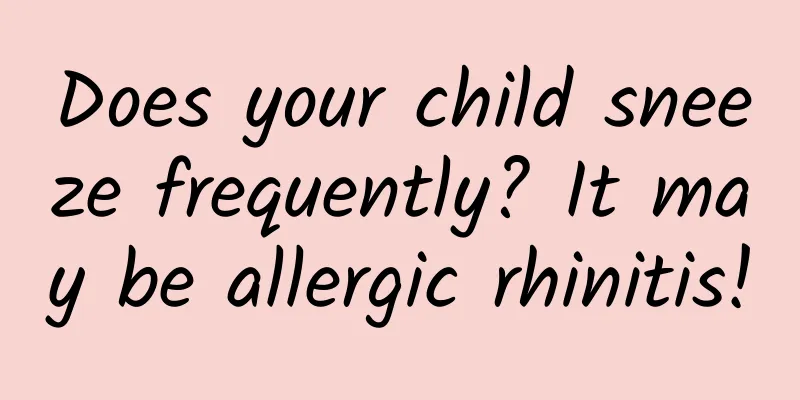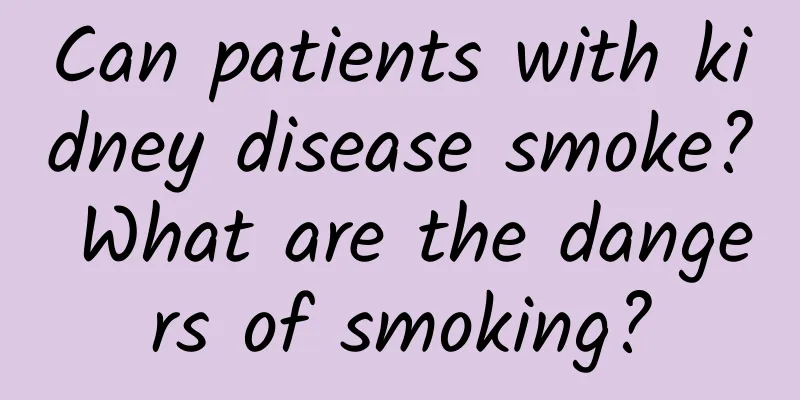Does your child sneeze frequently? It may be allergic rhinitis!

|
Author: Zhao Jing, Chief Physician, Children's Hospital, Capital Institute of Pediatrics Reviewer: Gu Qinglong, Chief Physician, Children's Hospital Affiliated to Capital Institute of Pediatrics In the warm and sunny season, children should be running freely and enjoying the joy of childhood. However, for some children, a seemingly ordinary day may be accompanied by unbearable nasal itching and continuous sneezing - this is the hidden trouble of children's allergic rhinitis. This chronic inflammatory disease not only affects children's daily activities and sleep, but may also subtly erode their physical and mental health. 1. What is allergic rhinitis in children? Allergic rhinitis in children is a chronic allergic inflammatory disease of the nasal mucosa, which is mainly caused by allergic factors in the environment. These allergic factors, also known as allergens, such as dust mites, pollen, animal fur, etc., stimulate the nasal mucosa and cause aseptic allergic reactions or allergic inflammation. The incidence of allergic rhinitis is high among children. According to statistics from different regions and age groups, the incidence is about 15%. It is one of the common upper respiratory tract diseases in pediatrics. Figure 1 Original copyright image, no permission to reprint The age of onset of allergic rhinitis has a certain regularity. In infancy, respiratory symptoms caused by food allergies are relatively rare because the main contact is food. As children grow older, they begin to participate in more outdoor activities, the types and quantities of allergens they are exposed to also increase, and the incidence of allergic rhinitis gradually increases. Especially after entering elementary school, the incidence of allergic rhinitis increases significantly due to the increased chances of contact with outdoor allergens. 2. Symptoms and hazards of allergic rhinitis in children Typical symptoms of allergic rhinitis in children include sneezing, runny nose, nasal congestion and nasal itching. Sneezing often occurs multiple times in succession, and the nasal discharge is mostly watery. Changes in body position may irritate the throat and cause coughing. Nasal itching often causes children to rub their noses frequently, and in severe cases may cause nosebleeds. Nasal congestion is caused by congestion and edema of the nasal mucosa, which may affect children's daily life and sleep quality in severe cases. In addition to these nasal symptoms, allergic rhinitis in children may be accompanied by other signs and symptoms, such as allergic salutes (the child rubs his nose from bottom to top), nasal wrinkles (nose wrinkles caused by frequent nose rubbing), dark circles under the eyes (allergic eye shadow), conjunctivitis, etc. In children with seasonal allergic rhinitis, lower airway allergy symptoms such as asthma, cough variant asthma, etc., may also occur, and even skin symptoms may be triggered. Figure 2 Original copyright image, no permission to reprint The harm of allergic rhinitis should not be underestimated. It may not only cause complications such as sinusitis, secretory otitis media, and pharyngitis, but also have a negative impact on children's sleep quality, mental state, and learning ability. Long-term allergic rhinitis may also lead to enlarged adenoids, further affecting breathing and sleep quality. In addition, allergic rhinitis may also have adverse effects on children's mental health, such as being misunderstood and discriminated against by others due to frequent sneezing, rubbing the nose, and other actions. 3. Diagnosis and treatment of allergic rhinitis in children The diagnosis of allergic rhinitis is mainly based on the child's symptoms and allergen test results. When the child has typical symptoms such as sneezing, runny nose, nasal congestion and nasal itching, the possibility of allergic rhinitis should be considered. Further allergen testing, such as skin prick test or serum specific IgE test, is performed to clarify the type of allergen. If the allergen test is positive and the symptoms are consistent with the allergen, allergic rhinitis can be diagnosed. It is worth noting that allergic rhinitis needs to be distinguished from colds. Acute rhinitis caused by colds has a shorter course and can heal itself in about 7-10 days, and is often accompanied by systemic symptoms such as fatigue and low fever. The symptoms of allergic rhinitis are regular and persistent, usually related to contact with specific allergens, and lack systemic symptoms. Once the diagnosis is confirmed, environmental control becomes key, including removing possible allergens from the home, such as regular cleaning to reduce dust mites, avoiding contact with pet hair, and taking protective measures during pollen season. Nasal irrigation is widely recommended as an auxiliary treatment method. Using isotonic saline for nasal irrigation not only helps to remove nasal secretions and allergens, but also promotes the recovery of damaged cilia, reduces nasal secretions, and thus relieves symptoms. Especially during the allergy season or during acute attacks of rhinitis, appropriate nasal irrigation can effectively relieve discomfort. |
<<: Food Allergy vs Food Intolerance: Can You Tell the Difference?
Recommend
Eye inflammation is not as simple as just putting in eye drops!
Eye mucus, eye redness, swelling, pain... These a...
How to distinguish good red wine from bad? How long should you decant the red wine in advance?
Red wine has been tasted and chosen by more and m...
Can I do it the day before my period?
For couples who are preparing for pregnancy, they...
Can I take a hot spring bath after the confinement period?
Confinement is a very important period of time in...
How many days of safe period are there after menstruation
I believe that friends who have regular sexual in...
Six months pregnant belly bloating
Starting from the sixth month of pregnancy, the e...
Why is a half marathon more dangerous than a full marathon?
A half marathon is 21.0975 kilometers, and a full...
What is vaginal malnutrition?
The vagina is one of the important organs in the ...
How many months is 31 weeks of pregnancy?
Many couples become very nervous when they find o...
What should I do if my period keeps bleeding?
The simplest way to tell whether a person is preg...
What should women eat to supplement their kidneys?
For women, kidneys are also very important organs...
Entering peak season! Urgent reminder: Don’t eat!
Have you heard of this proverb? "Sugarcane d...
Will ovulation occur 3 days before menstruation?
Menstruation is a normal physiological phenomenon...
In addition to blowing your nose, you can also deal with snot in this way
★ When dealing with snot, blowing your nose or pi...
Is there fetal movement in 3 months of pregnancy?
Fetal movement after pregnancy can reflect the gr...









